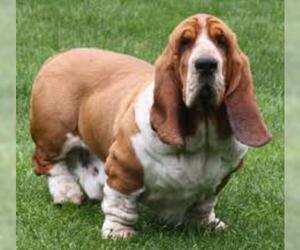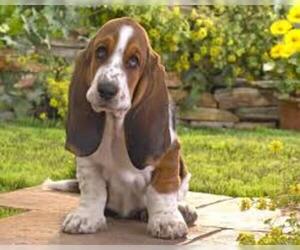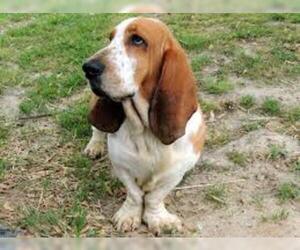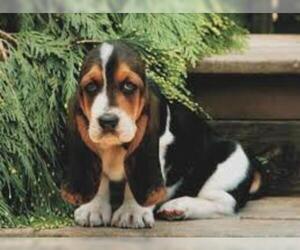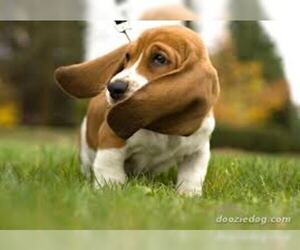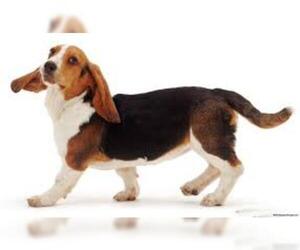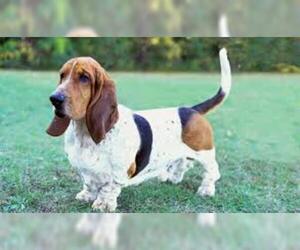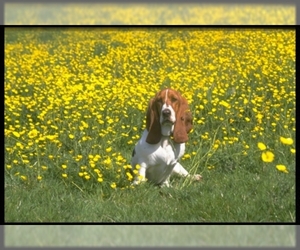
All about Basset Hound dog breed
A.K.A. :Basset, French Basset, Low-Set Hound, Dwarf Hound, Little Hound, Badger Dog, Basset Hounds, Basset dog, Basset Dogs, Basset breed, Basset hound dog, Basset hound breed
Size
Grooming requirements
Exercise requirements
Good with other dogs
Watchdog ability
Energetic
Training requirements
Playful
Affectionate
Good with other pets
Good with children
Good with strangers
Winter
Summer
Healthiness
Protective
Life Span
| Pure Breeds | Member |
| Breeds A - Z | B |
| Breeds by Group | Hound Scenthound |
| Breeds by Trait | Good With Kids Low Shedding |
| Overview: | The Basset Hound is a charming and distinctive breed, originating in France as a scent hound primarily used for hunting hare and rabbit. Easily recognized by their long, droopy ears, sad-looking eyes, and short, sturdy legs, they possess an incredibly powerful sense of smell. Despite their somewhat mournful expression, Bassets are known for their gentle, laid-back, and affectionate temperament, making them wonderful companions for families. They are generally good with children and other pets, though their stubborn streak and loud baying bark require consistent training. While they can adapt to apartment living with sufficient daily exercise, their tendency to follow their nose means a secure yard is essential. Potential owners should be aware of common health concerns such as ear infections due to their long ears, back issues, and bloat. Overall, the Basset Hound is a loyal and loving, if sometimes comically determined, addition to many homes. |
F.A.Q.
All You Need to Know About the Basset Hound BreedThe Basset Hound, with its distinctive long, droopy ears and melancholic eyes, is a charming and affectionate breed originating from France, bred for hunting small game. Known for their calm and gentle temperament, Basset Hounds are excellent family pets, getting along well with children and other animals. Their short, smooth coat is low-maintenance, requiring only weekly brushing, but their long ears need regular cleaning to prevent infections. Despite their somewhat lazy appearance, these hounds possess a strong sense of smell and a surprising amount of stamina, though daily moderate exercise is sufficient to keep them healthy. They are adaptable to apartment living, provided they receive their daily walks and mental stimulation. Common health concerns include ear infections, bloat, and joint issues, making regular vet check-ups important. If you’re looking for a loyal, laid-back companion with a unique personality, the Basset Hound might be your perfect match.
Basset Hound Weight: Average Size & Healthy Weight for Basset HoundsThe average weight for an adult Basset Hound is typically between 40-60 pounds.Generally, male Basset Hounds tend to be slightly heavier, weighing around 50-65 pounds, while females usually fall within the 45-60 pound range. Maintaining a healthy weight for a Basset Hound is crucial for their well-being, as obesity can lead to joint problems and other health issues. Potential adopters should note that a healthy Basset Hound will have a defined waist and easily palpable ribs.
How Tall is a Basset Hound? Understanding Basset Hound Height and Average SizeWhen considering a Basset Hound, understanding their typical size is key! These charming dogs are known for their long bodies and short legs. The average height of a Basset Hound is typically measured at the shoulder.For an adult Basset Hound, you can expect their Basset Hound height to fall within a range of 13 to 15 inches (approximately 33 to 38 cm) at the shoulder.While there isn't a significant difference in how tall is a Basset Hound based on gender, male Basset Hounds may sometimes be at the upper end of this range or slightly taller than females. However, individual genetics and overall build play a larger role. Some Basset Hounds may be a little shorter or taller than average, but they should always maintain the breed's characteristic low-slung appearance and sturdy build. This information is helpful when comparing breed dimensions for your next family member!
Basset Hound colors are quite diverse, with the American Kennel Club (AKC) recognizing any true hound color. This generally includes Tri-Color (black, white, and tan or lemon), Black & White, Lemon & White, Red & White, and Mahogany & White. Other common and AKC-accepted variations include brindle, which appears as stripes of color, and various shades of tan and white or lemon and white. You might also see Basset Hounds in sable and white.For those interested in rare Basset Hound coat types or exotic Basset Hound variations, it's important to note that colors like blue Basset Hound, lilac Basset Hound, merle Basset Hound, or chocolate Basset Hound are not standard or accepted by major kennel clubs like the AKC. While these colors might occasionally appear due to specific genetic combinations, they are considered disqualifying faults in the show ring and are often indicative of mixed breeding or health concerns in other breeds. Therefore, if you encounter Basset Hound puppies advertised with these rare Basset Hound colors, exercise caution and inquire about their lineage and health clearances. Pricing for these non-standard colors can vary significantly, often reflecting their novelty rather than their adherence to breed standards.
The Basset Hound personality is generally friendly, loyal, and quite sociable. These dogs are known for their gentle and patient temperament of Basset Hound, making them excellent companions. They are remarkably adaptable to apartment living due to their relatively low indoor energy and love for napping, though daily walks are essential. Bassets are typically very good with children, displaying a tolerant and affectionate nature, making them wonderful family pets. They also tend to get along well with other pets, including cats, thanks to their easygoing disposition. While they can be stubborn due to their strong scent drive, their affectionate nature usually outweighs any training challenges.
The Basset Hound temperament is generally described as gentle, amiable, and patient, making them excellent companion dogs. They are known for their incredibly friendly and sociable nature, enjoying the company of both humans and other animals. Bassets are loyal to their families and can be very affectionate, often seeking out cuddles and attention.While their long bodies might suggest otherwise, Basset Hounds are surprisingly adaptable to apartment living as long as they receive adequate exercise and mental stimulation. They are not typically high-energy dogs, often content with a good daily walk and plenty of naps.With children, Basset Hounds are typically very tolerant and good-natured, making them wonderful family pets. Their patient disposition allows them to handle the antics of young children with grace. Similarly, they generally get along well with other pets, including other dogs and cats, due to their non-aggressive and easygoing personality.A key personality trait to be aware of is their occasional stubbornness. Being scent hounds, they can become singularly focused on a scent trail, making recall challenging if not properly trained. This can manifest as a selective hearing when their nose is on the ground! While not overly sensitive, they do respond best to positive reinforcement training methods. They are generally not prone to anxiety but thrive on companionship and can become bored if left alone for extended periods without enrichment.
Basset Hound Care: Daily Maintenance & Health TipsCaring for a Basset Hound involves understanding their unique needs. Grooming needs are moderate; their short, dense coat benefits from weekly brushing to minimize shedding. Wrinkle and ear cleaning are essential. Their deep facial wrinkles require daily wiping to prevent skin infections, and their long, floppy ears need frequent cleaning (at least weekly) to prevent ear infections due to poor air circulation.Exercise limitations are important to note. Basset Hounds are a low-energy dog breed that enjoys short, leisurely walks. Over-exercising can strain their long backs and joints. Aim for two 20-30 minute walks daily. They thrive on mental stimulation through scent games and puzzle toys.Dietary considerations are crucial for weight management. Bassets are prone to obesity, which exacerbates joint problems. Feed a high-quality, measured diet appropriate for their age and activity level, avoiding free-feeding. Consult your vet for specific portion recommendations.Climate sensitivity due to brachycephalic anatomy means they struggle in extreme heat. Keep them indoors during hot weather and ensure they have access to cool, shaded areas and fresh water. Their short snouts make them less efficient at cooling themselves.Common Basset Hound health concerns include skin issues (especially in their wrinkles and ears), dental care (they are prone to dental disease, so daily brushing is ideal), and joint problems like intervertebral disc disease (IVDD). Regular vet check-ups are vital for early detection and prevention. How to care for a Basset Hound involves a consistent routine of proper grooming, moderate exercise, a balanced diet, and attentive health monitoring.
The Basset Hound activity level is generally low to moderate. While they possess surprising stamina for tracking, Basset Hounds are not high-energy dogs. They are known for balancing short bursts of enthusiastic activity with long periods of rest and napping. Daily Basset Hound exercise needs include at least 30-60 minutes of moderate activity, such as a leisurely walk or supervised playtime in a securely fenced yard. They enjoy sniffing expeditions and exploring, which mentally stimulates them.
Due to their brachycephalic (short-nosed) anatomy, Basset Hounds are sensitive to heat and humidity. Strenuous exercise in hot weather should be avoided to prevent overheating and breathing difficulties. Their short legs and long backs also make them prone to spinal issues, so jumping from heights and excessive stair climbing should be limited. They prefer gentle play with toys, scent games, and comfortable naps on soft surfaces.How active are Basset Hounds? They are not suitable for highly active families seeking a jogging or hiking companion. Instead, they thrive in low-energy households or with individuals who enjoy relaxed strolls and appreciate a calm, laid-back canine companion. Their strong scent drive means a secure leash or fenced area is crucial during outdoor activity to prevent them from following an interesting smell and getting lost.Breed Breakdown: What Experts Say About the Basset Hound
I would rate the Basset Hound's "Size" trait as a 4.While not miniature, Basset Hounds are distinctly a medium-sized dog. They have a surprisingly heavy, muscular build for their relatively short stature, with an average weight ranging from 40 to 65 pounds and a height of around 14-15 inches at the shoulder. Their long bodies contribute to a larger overall footprint than their height might suggest, but they are far from the imposing size of a Great Dane or even a Labrador. Compared to many companion breeds, they are on the smaller end of the medium spectrum. Their low-slung, sturdy frame makes them adaptable. They are generally well-suited for apartment living, especially if given regular walks, as their exercise needs are moderate, and their low height means they don't take up excessive vertical space. Their compact, albeit long, form also makes them relatively manageable for travel compared to giant breeds, and they are definitely a good option for households with space constraints due to their ability to curl up and their less demanding need for vast open spaces.
I would rate the Basset Hound's grooming requirements as a 7.While their short, smooth coat might initially suggest low maintenance, the reality is a bit more involved. They shed moderately year-round, requiring regular brushing to manage the loose hair and distribute natural oils. The biggest contributors to their higher rating are their prominent skin folds and those incredibly long ears. The skin folds around their face and neck are prone to trapping moisture and debris, necessitating daily cleaning to prevent skin infections and irritation, which they are somewhat susceptible to. Similarly, their long, pendulous ears, while adorable, are a haven for dirt, yeast, and bacteria, making weekly deep ear cleaning an absolute must to prevent painful ear infections. Nail trimming is also crucial due to their laid-back nature, as they don't wear down their nails as effectively as more active breeds. While they don't need frequent bathing, when they do, attention to thoroughly drying all those folds is key. Compared to many other short-coated breeds, Basset Hounds require more frequent and specialized attention to their ears and skin folds to keep them healthy and comfortable.
I would rate the Basset Hound's exercise requirements as a 3.While they aren't completely sedentary, their exercise needs are definitely on the lower end of the spectrum. Daily activity recommendations typically involve a couple of moderate walks, perhaps 20-30 minutes each, or equivalent playtime in a secure yard. Their energy levels, especially as adults, are generally low to moderate. They enjoy a good sniffari and a leisurely stroll, but they aren't built for sustained, high-intensity movement. Their brachycephalic anatomy, while not as pronounced as some other breeds, means they can be prone to overheating and respiratory difficulties with strenuous exercise, especially in warm weather. They are absolutely not suited for agility or long-distance running. They thrive with minimal, consistent activity that allows them to engage their powerful noses, and while they appreciate routine, it's more about consistent, gentle movement than a demanding, structured exercise regimen. Too much activity can actually be detrimental to their joints, and too little can lead to obesity, but they certainly don't require intense physical demands to stay healthy and mentally stimulated.
I'd rate the Basset Hound's "Watchdog Ability" at a 2 out of 10.While a Basset Hound might let out a characteristic, deep "bay" when someone unfamiliar approaches the door or an unexpected sound startles them, this is more of a startled reaction than a deliberate act of vigilance or deterrence. They are generally not particularly alert to their surroundings in a protective sense; their primary focus tends to be on interesting scents or the next nap. They lack strong territorial instincts and are more likely to greet an intruder with a curious sniff (or even an attempt to make friends) than with a show of aggression. Their low energy and laid-back demeanor mean they're unlikely to actively patrol or respond to perceived threats. Essentially, a Basset is a passive companion; any "warning" they provide is typically an unintentional side effect of their vocalization, not a meaningful early warning system, and they certainly wouldn't deter an intruder.
I'd rate the Basset Hound's "Good with Other Dogs" trait a strong 9 out of 10.Basset Hounds are, by and large, incredibly sociable and affable dogs, particularly when it comes to their canine counterparts. Their pack-oriented heritage means they typically thrive in the company of other dogs, often preferring it to being alone. They tend to be remarkably tolerant and easygoing around unfamiliar dogs, displaying little to no aggression or dominance. Their low-key, laid-back nature makes them compatible with dogs of various sizes and energy levels, as they are rarely confrontational and generally happy to go with the flow. While all dogs benefit from early socialization, Bassets usually require minimal effort to coexist peacefully, often integrating seamlessly into multi-dog households. They rarely initiate conflict and are more likely to seek out a quiet corner or a friendly sniff than to assert dominance. They truly seem to find joy and comfort in canine companionship, making them an excellent choice for homes with existing dogs or those considering adding more.
I would rate the Basset Hound's "Energetic" trait as a 2.The Basset Hound is a prime example of a laid-back companion dog. Their typical activity level is very low; they are renowned for their love of napping and leisurely strolls rather than vigorous activity. While they do enjoy a good sniff-a-thon, their endurance is quite limited, and they quickly tire. Playfulness tends to be in short bursts, often involving a favorite toy from a lying-down position, rather than extended romps. Their need for physical stimulation is minimal, primarily satisfied by a few short walks a day to keep them healthy and allow them to explore with their powerful noses. They are certainly not built for and would not enjoy participating in demanding outdoor or athletic activities. Their brachycephalic anatomy, while not as pronounced as some other breeds, does contribute to their lower stamina and exercise tolerance, making them more susceptible to overheating and breathing difficulties with strenuous exertion, thus reinforcing their naturally relaxed demeanor.
I would rate the Basset Hound's "Training Requirements" at a 7 out of 10.While not impossible to train, they are far from "very easy." Their intelligence is often overshadowed by their infamous stubbornness and a very short attention span, especially if a more interesting scent is present. Responsiveness to commands can be highly variable; they are excellent at selective hearing when they'd rather be sniffing or napping. Consistency is absolutely crucial, and positive reinforcement, particularly with high-value treats and praise, is the most effective method, as harsh methods will only make them shut down. This breed is not particularly beginner-friendly for training, as their innate independence and scent-driven nature can be frustrating for those new to dog training. Experienced handling and structured, consistent routines are highly recommended to navigate their charming but often challenging training quirks.
I'd rate the Basset Hound's "Playful" trait a 4 out of 10.While they are certainly affectionate and enjoy interaction, Basset Hounds are far from an energetic, fun-loving powerhouse. Their typical activity level is quite low; they much prefer a good nap on the couch to an intense game of fetch. They do show some interest in games and toys, especially if food is involved or if it involves their excellent nose, but their enthusiasm is generally muted and short-lived. They aren't particularly attention-seeking in an energetic way, often content to simply be near their people. In daily life, their enthusiasm is more for comfort and scent-tracking than for boisterous play. Compared to many other companion dogs, they are decidedly more laid-back and stoic, often exhibiting a charmingly unbothered demeanor rather than a naturally spirited one.
I would rate the Basset Hound's "Affectionate" trait a 9 out of 10.Basset Hounds are exceptionally loving and people-oriented, truly thriving on human companionship. They have a strong desire to be near their family, often following them from room to room like a shadow. Physical closeness is a hallmark of the breed; they are renowned for their willingness to cuddle, lean into you, and, despite their size, attempt to be lap dogs. Their loyalty is unwavering, and they are quite sensitive to the emotions of their owners, offering a comforting presence when needed. While they possess a certain independent streak when it comes to following their nose on a scent, this doesn't translate to emotional distance from their family. They are far from independent in terms of their need for affection, genuinely blossoming when they receive ample attention and love, making them one of the most demonstratively affectionate companion breeds.
I would rate the Basset Hound's "Good with Other Pets" trait a 9 out of 10.Basset Hounds are generally very amicable and peace-loving dogs, making them excellent companions in multi-pet households. Their low prey drive is a significant factor, as they are bred for scent trailing rather than actively hunting and killing. This means they are less likely to view smaller pets like cats or rabbits as prey. While they can have a stubborn streak, their default setting is usually gentle curiosity rather than aggression. They are typically quite sociable with other dogs and often enjoy canine company. Resource guarding is not a prominent trait in the breed, though early socialization and positive reinforcement are always beneficial for any dog. While supervision is always recommended when introducing any new pet, Basset Hounds tend to adapt well and readily accept other animals into their "pack" with their calm and tolerant nature. Their laid-back temperament means they are naturally quite pet-friendly and require less intensive training to coexist peacefully compared to many other breeds.
The Basset Hound rates a solid 8 out of 10 for "Good with Children."This breed is exceptionally well-suited for families with children due to its inherently gentle and patient nature. Basset Hounds are renowned for their calm and laid-back temperament, which translates into a remarkable tolerance for the unpredictable energy and noise often associated with kids. They are not prone to aggression and possess a high threshold for being handled, poked, and prodded, making them an excellent choice for younger children who are still learning appropriate interaction. While not overly playful in an energetic, boisterous way, they enjoy gentle interaction and attention, often content to simply be near their little human companions. They are naturally affectionate and form strong bonds with their family members, including children, often seeking out cuddles and leaning against them. While basic obedience training is always beneficial for any dog, a Basset Hound's gentle disposition means they don't typically require extensive training or constant supervision to thrive in a family setting; their natural temperament predisposes them to be loving and tolerant companions.
The Basset Hound's "Good with Strangers" trait rates a solid 8 out of 10. They are, by nature, a remarkably amiable and tolerant breed. While not typically exhibiting the boisterous, tail-wagging exuberance of some breeds upon meeting a new person, they are almost universally friendly and welcoming. Their demeanor is more one of gentle curiosity and acceptance rather than suspicion or aloofness. They rarely show aggression or excessive barking towards unfamiliar adults; in fact, their deep, mournful bay is more likely to be used to express a desire for attention or to announce something interesting in their environment, rather than a threat. Their strong pack drive, honed over centuries of hunting in groups alongside humans, contributes to their inherent comfort around people, whether familiar or not. They generally adapt well to public or guest-filled environments, often enjoying the extra attention and a potential new ear to scratch. While good socialization is always beneficial for any dog, a Basset Hound's natural disposition means they typically don't require extensive training to be comfortable with strangers; it's more their default setting. They are far more likely to lean in for a sniff and a head rub than to back away or guard.
I would rate the Basset Hound's "Winter" tolerance at a 4.While their short legs keep them close to the insulating ground and they possess a fair amount of body fat, their short, dense coat offers limited protection against sustained cold, and it is not a double coat designed for insulation. Their relatively large, pendulous ears are also susceptible to frostbite. Being a medium-sized breed, they don't have the robust surface area-to-volume ratio of very large dogs that can help retain heat. Furthermore, while not severely brachycephalic, their snouts are shorter than many other breeds, which can sometimes make breathing cold, dry air more challenging for some individuals, though this is less of a primary factor for cold tolerance compared to their coat. They are certainly at risk of hypothermia in prolonged or extreme cold without protection. Compared to many other companion dogs, Basset Hounds definitely require special care during winter months, needing sweaters or coats for walks in freezing temperatures and should not be left outdoors for extended periods in cold climates.
Rating: 3Explanation: Basset Hounds have poor summer tolerance due to several factors. Their brachycephalic (short-nosed) anatomy significantly hinders their ability to cool down efficiently through panting, making them highly susceptible to overheating. Their long, heavy bodies and short legs also make them less efficient at regulating their body temperature, and their dense coats, while not extremely thick, don't aid in cooling. They are at a high risk of heatstroke, even with moderate activity in warm weather. Therefore, Basset Hounds absolutely require special care in summer months, more so than many other companion dog breeds. They should have limited outdoor activity during the hottest parts of the day, access to plenty of water, and consistent access to climate control indoors, with air conditioning being essential on hot days. They cannot be left unsupervised outdoors in the heat.
I would rate the Basset Hound's "Healthiness" trait as a 4.While charming and generally good-natured, Basset Hounds are unfortunately predisposed to a significant number of breed-specific health issues that bring down their overall health score. Their long, heavy bodies on short legs make them highly susceptible to various joint problems, most notably intervertebral disc disease (IVDD) and elbow and hip dysplasia, which can be debilitating and require extensive veterinary care. Their distinctive long, pendulous ears are prone to infections, and their loose skin, especially around the face, can lead to skin fold dermatitis. Eye issues like entropion and ectropion are also relatively common due to their facial structure. Furthermore, like many deep-chested breeds, they are at a higher risk for bloat (gastric dilatation-volvulus), a life-threatening condition. While responsible breeding practices and preventive care can mitigate some risks and extend their life expectancy beyond the lower end of their typical range (10-12 years), the sheer number of inherent genetic predispositions means they are generally considered high-maintenance in terms of health compared to more robust companion dog breeds. They are not a breed known for exceptional resilience, often requiring proactive management of potential health problems throughout their lives.
I would rate the Basset Hound's "Protective" trait as a 2 out of 10.While Basset Hounds are incredibly loyal and affectionate companions, they are simply not bred for protection and lack the inherent instincts for it. They are generally very friendly and tolerant, even with strangers, and their territorial instincts are minimal. Their low energy levels and easygoing nature mean they are unlikely to react aggressively to perceived threats. While their surprisingly loud bay can certainly alert owners to an intruder, it's more of a "hello" than a "get out!" They are absolutely wonderful companion dogs, thriving on human interaction and offering boundless love, but they are entirely unsuited for roles as watchdogs or guard dogs, and relying on them for meaningful protection in a household setting would be ill-advised.
I would rate the Basset Hound's "Life Span" trait a 6 out of 10.While not exceptionally long-lived, Basset Hounds generally enjoy an average lifespan of 10 to 12 years, which is respectable for a medium-to-large breed. They aren't considered particularly short-lived, but they also don't typically reach the advanced ages seen in some smaller breeds. Common health issues like intervertebral disc disease (IVDD) and bloat, along with genetic predispositions to conditions like glaucoma and certain cancers, can unfortunately shorten individual lifespans. However, responsible breeding practices that screen for these conditions, coupled with proper weight management, a balanced diet, and regular veterinary care, significantly contribute to helping Basset Hounds reach the higher end of their expected life range, and sometimes even surpass it.
Basset Hound Puppies for saleSee all puppies for sale
Basset Hound Dogs for adoptionSee all dogs for adoption
Basset Hound BreedersSee all breeders
Similar Dog Breeds for Basset Hound
Breed Mixes of Basset Hound
Quick Breed Selector 0 - not important, 1 - smallest, 10 - largest
Variants & Mistakes :Bassett Hound, Basset Houn, Basset Hown, Bassethound, Basset Hoound, Baset Hound, Basset Hond, Bassett Houn, Bassethond, Bassetthound, Basset Hoond, Bassest Hound, Bassit Hound, Basset Hownd, Basett Hound, Basset Houng, Bassethounde, Basset Houund, Bassit Hownd, Bassett Houng, Bassett Haund, Bassett Hawnd, Bassett Houne, Bassetthond, Bassett Hund, Bassett Hood, Basset Hood, Basset Hud, Basset Haound, Bassetthounde, Bassethoumd, Basset Howund, Basset Howndd, Basset Haund, Basset Hawund, Basset Haoundd, Basset Hounnd, Basset Houned, Basset Houndd, Basset Hounde, Bassetthoundd, Bassetthownd, Bassetthownde
